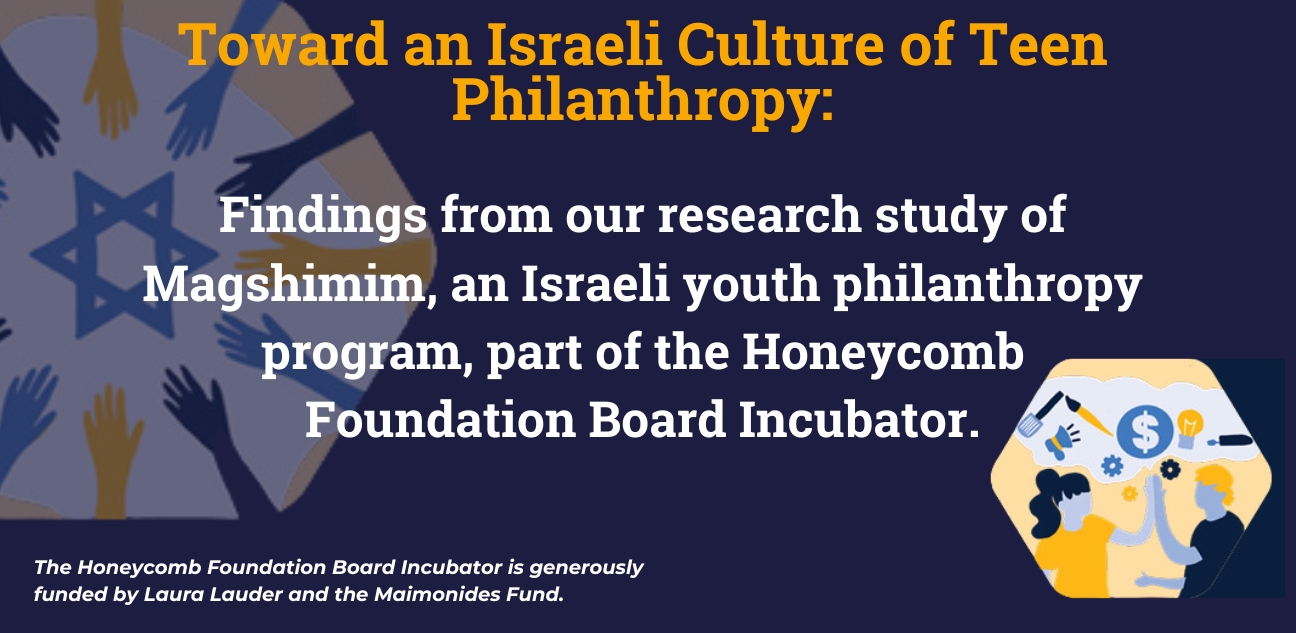Israeli teens in youth philanthropy programs are profoundly impacted—developing new leadership skills, becoming agents of change and gaining knowledge of the Israeli philanthropic ecosystem, according to a new report released by Honeycomb.
“Toward an Israeli Culture of Teen Philanthropy: Assessing Magshimim” shows that in the 15 community centers in Israel with the Magshimim philanthropy program—many of which are from underserved communities—participants began to associate giving and improving the world with Jewish values and as part of their Jewish identity.
“There’s always been this question around Israel and a culture of philanthropy,” said Laura Lauder, whose family venture-philanthropy fund, in partnership with the Maimonides Fund, has supported the Honeycomb Foundation Board Incubator. “Through this program, we see how deeply the teens are impacted, and how they teach and model philanthropic engagement for their parents. This is incredibly inspiring and can have a positive influence on Israeli society.”
A teen in the Magshimim program added, “I am more patient and caring. We [program participants] are busy looking out for others and less focused on ourselves. Before, I used to mainly see myself. I think this year has been the most meaningful in my life.”
In the Magshimim program, like other Honeycomb programs, teens are introduced to philanthropy through a Jewish lens with a grantmaking curriculum that guides them through the philanthropic process. They learn to develop mission statements and make grant decisions, among other skills. Honeycomb partnered with the Israeli Association of Community Centers in 2018 to launch the program in community centers across Israel. In the 2022-23 school year, Magshimim operated in 15 community centers across the country, bringing together more than 800 teens from diverse communities to learn about and address key issues in Israeli society.
Rosov Consulting’s evaluation efforts surveyed four groups of teens: participants who only recently joined the program; participants who completed their first year in the program; participants who completed two or three years in the program; and a comparison group of teens who expressed interest in joining Magshimim but did not participate in in the program.
Among the key findings from the independent evaluation conducted by Rosov Consulting:
- Participants gained more positive attitudes towards philanthropy and Jewish giving.
- Teens’ attitudes towards philanthropy, including volunteering, grantmaking or fundraising, improved considerably.
Many of the teen groups expressed a passion for fundraising and volunteering as ways to connect with people in their community who need their support.
The majority of Magshimim participants see a clear connection between giving and Jewish identity, which stands in stark comparison to nonparticipants, only a small fraction of whom make this connection.
Participants gained deep knowledge and skills in various domains. - Long-term program participants were more likely than new participants to report strong leadership skills. The biggest difference between the two groups was in their comfort in leading a group and standing in front of an audience.
- Long-term participants are nearly twice as likely as new participants to gain the ability to fundraise for social initiatives and conduct research on different organizations (for the purpose of donating).
- Magshimim teens gained invaluable knowledge about nonprofit organizations.
Long-term Magshimim participants feel more empowered and aware of their community’s needs than new participants.
“For the many Israelis looking for meaningful Jewish expression, these programs can fill a void,” said Danielle Segal, executive director of Honeycomb. “Moreover, the programs have a real impact in these communities and their community centers. I’m excited that this meaningful model of youth engagement is thriving in Israel.”
Rosov Consulting assessed the impact on the community as well, which was positive. Many community-center directors reported that the resources associated with running the Magshimim program boosted their facilities and attracted new teens to the program. Interviewees believe the program made a positive change to their community; the majority of contributions and donations went to local causes.
Center directors and counselors noted the ripple effects of the program on the teens’ families as well as the broader community. Some interviewees also mentioned an especially positive impact on at-risk participants, as the program provided an outlet for their energies and a platform to channel them away from potential negative behaviors.
Through Honeycomb’s support, guidance and resources, youth philanthropy programs teach teen participants about their communities and local nonprofit organizations; relevant social-justice issues; and the process of evaluating proposals to allocate funds raised to a chosen organization or cause.
Interview data suggest that most Magshimim participants come from low- to medium-income households and economically disadvantaged families, including three groups of teens who are considered “at risk” because they face various challenges in their lives, such as mental health, family problems or involvement in risky behaviors. Some of the groups have distinctive characteristics: In one of the groups, most teens are from the Ethiopian community; in another group, most teens are children of immigrants from the former Soviet Union; in another group, most teens identify as LGBTQ+.
The evaluation of Magshimim, Honeycomb’s Teen Philanthropy Program in Israel, was funded through the Honeycomb Foundation Board Incubator, generously funded by Laura Lauder and the Maimonides Fund.
Read the article from JNS here.
